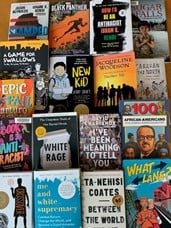Antiracist Parenting is a Journey Not a Destination
Antiracist Parenting is a Journey Not a Destination

Parenting is an increasingly complex job. It’s layered with important responsibilities one of which is raising anti-racist children. In addition to being a Registered Psychologist, I am also a parent, a white parent, who wonders what I can do to engage with this important work. I have learned that I can be doing more at home to raise antiracist children, and that the responsibility is mine and not that of the Black and Brown communities. I identify as a cis-gender, straight female, European white settler residing in North America on unceded land, married to a bi-racial man, traversing the planet as an immigrant since age 6. I have lived in England, the Middle East, the US, and now Canada, and have training in both Psychology and Women’s Studies. Yet, despite my identity and life experiences, I feel unsure of where to begin.
Perhaps you, like I, have moved through the world with white privilege and a culture of silence where talking about race and ethnicity is rare. If you were not raised knowing how to talk about these important topics, you may now face anxiety as you grapple with how to raise an antiracist child. In contrast to my (and maybe your) reality, many parents of colour have been doing this important work all along. In fact, they have had no choice but to have “the talk” (read or watch) in their households to keep their children safe. Given the long-standing history of racism and oppression globally, it is time we all do this important work and become anti-racist parents who raise anti-racist kids. Rather than letting anxiety, intimidation or guilt lead us to silence and inaction, I’d like to highlight basic building blocks that parents can use to begin this critical anti-racist journey.
- Begin within: Most articles/books/blogs on becoming anti-racist recommend educating yourself as a first step. And, while that might feel intimidating, it doesn’t have to be complicated. Begin with an internet search on “how to be antiracist,” or, “anti-racist parenting.” Then explore how privilege has shaped who you are. If you like to read, there’s no better time than now to create your own library, and there are some excellent resources to guide your self-reflection. Or alternatively you can learn through movies. It won’t necessarily be comfortable but it’s essential. Be a sponge- there’s lots to soak up!
- Talk the talk: Although hard, it’s absolutely critical that we start talking with our kids about race, ethnicity, and other aspects of human identity early on. Begin small. Perhaps you make a comment to draw your child’s awareness to inequity or negative stereotypes when you notice them, rather than turning a blind eye. Or you pose a question. Kids are naturally curious, so tap into that. For example, you can ask: Have you noticed that all the characters in this TV show have light skin? Why do you think that is? Discuss and do it often and be aware that you don’t have to know all the answers. Admitting you’re uncomfortable or that you don’t understand something can be just as important of a teaching/learning experience as being the expert.
- Discover together: Together with your child: Read books, articles, websites; watch videos, TV shows, movies; listen to podcasts, audio files, music, interviews. Take turns choosing the topic of interest or the medium to explore. When you diversify your media content to include more than white viewpoints, you learn exponentially. Also, be an active viewer by taking time afterwards to talk together about what you learned. Then integrate these ways of learning as an ongoing part of your routine, occurring throughout the year-- not just in February. The point of discovering together as a family is to increase your knowledge and grow together.
- Create a family dictionary: Familiarize yourself with key terminology that your children and you need to know. Find out about: microaggressions, privilege and fairness, equality versus equity, and many more. If you’re in your 30’s, 40’s or 50’s chances are you may not know a lot of these terms either, so it’s a great opportunity to learn together.
- Diversify your homes: This is especially important in the younger years. Buy books toys, and games that include Black and Brown faces (And not just 1 or 2…does your kid’s room reflect our increasing national diversity?), teach about fairness and equity, and encourage inclusivity (not just tolerance).
- Walk the walk: Encourage experiential learning by integrating diverse experiences into your daily lives. Model to your children how to be anti-racist (and not just not racist) by embracing opportunities to respectfully learn from others by stepping outside of your norm or comfort zone. Shop at a grocery store that represents an ethnicity different than yours, attend a global music venue, or eat at a new restaurant with new types of food for your family. These experiences show your kids that you appreciate multiculturalism and value inclusivity.
- Get creative: Knowledge does not have to be dry and formal. Check out these creative ways to teach and learn anti-racist content: periodic table, 21 day challenge, 31 day challenge, and for the younger ones.
- Celebrate diversity: Help your kids be excited about diversity and the opportunities it creates. Have them imagine eating the same foods every day for the rest of their lives and how boring this would be. Encourage them to be excited to have new and diverse experiences, including within their friendships. If you notice your friendship group and that of your children’s is overwhelmingly white (or not diverse), try joining clubs, classes, and activities where there is greater representation of race and ethnicity. And if there are limited resources in your immediate community, try going online and meeting people that way. Seek opportunities to celebrate diversity and inclusivity wherever you can.
Antiracist parenting is a journey not a destination. Antiracist educators underscore that to be antiracist we will spend our lifetime learning and growing, and there will be a lot of discomfort. We must be honest about our shortcomings and ignorance, and at the same time be earnest in our efforts to make meaningful change with our everyday actions. As when you first became aware that you were going to have a baby and likely knew little about parenting a toddler or teen, you learned, and so too can you learn to be an antiracist parent.
If you have ideas, resources, and links to share please post in the comment section below as we will all benefit.












